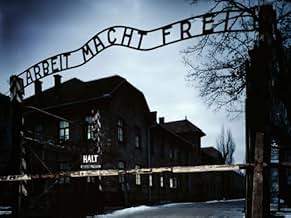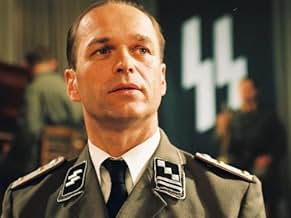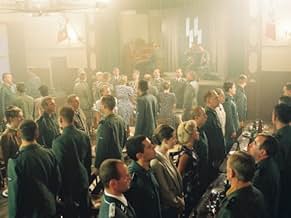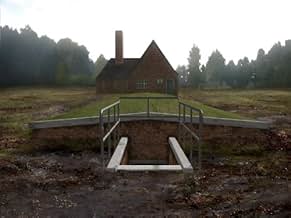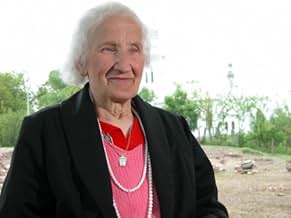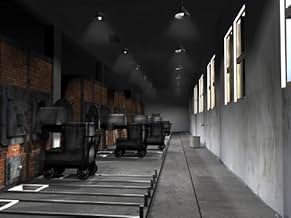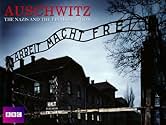Auschwitz: Los nazis y la solución final
Título original: Auschwitz: The Nazis & the 'Final Solution'
- Miniserie de TV
- 2005
- 48min
PUNTUACIÓN EN IMDb
8,6/10
4,7 mil
TU PUNTUACIÓN
Añade un argumento en tu idiomaThe history of the Final Solution phase of the Nazi Holocaust, particularly with the most infamous of the death camps.The history of the Final Solution phase of the Nazi Holocaust, particularly with the most infamous of the death camps.The history of the Final Solution phase of the Nazi Holocaust, particularly with the most infamous of the death camps.
Explorar episodios
Reseñas destacadas
TV often fails to convey complex information: both in facts and emotionally; instead it mostly serves up the obvious with images to trick our eyes.
This documentary sets a new standard: the research is impeccable, the interviews gripping, the production perfect in every respect and finally the horror, the terrible horror of what humans can do, is absolutely clear. A history book could not do a better job.
One of the best and bravest aspects of the series is when the interviewers ask a person how they felt about a murder they committed: did they regret it, how do they feel about it now? Those interactions make it worth watching the series alone.
This documentary sets a new standard: the research is impeccable, the interviews gripping, the production perfect in every respect and finally the horror, the terrible horror of what humans can do, is absolutely clear. A history book could not do a better job.
One of the best and bravest aspects of the series is when the interviewers ask a person how they felt about a murder they committed: did they regret it, how do they feel about it now? Those interactions make it worth watching the series alone.
This is a superbly produced documentary, based largely on information that has come to light since information from the eastern bloc countries and former Soviet Union became accessible.
The documentary comprises mainly of interviews with surviving SS soldiers and surviving prisoners from the Auschwitz and similar camps. It uses CGI special effects, combined with film of the Auschwitz camps to achieve the most realistic reconstruction of how it looked, and how it operated. Dramatisations of various meetings and events have been authentically reconstructed with well cast actors.
The stories from the survivors, particular in the episode about children, are the most moving I've ever seen in a documentary. The combination of original photographs, moving music and a first hand account from a survivor make these stories most poignant.
It does not demonize the Nazi's, but gives in insight into the mentality that pervaded the regime. It shows them as lacking empathy. We see evidence that not only the Germans, but many French, many Hungarians and many Slovakians were only too willing to help deport their Jews; even the British Police, on the Nazi occupied Channel Islands, were willing to send Jews to the east. Finally, the documentary shows how the surviving Jews, or their return to their homeland, were treated badly by their fellow countrymen.
This documentary shows that what happened in the holocaust happened because humans, not just Nazi's, are capable doing terrible things to humanity, given a certain set of circumstances.
The documentary comprises mainly of interviews with surviving SS soldiers and surviving prisoners from the Auschwitz and similar camps. It uses CGI special effects, combined with film of the Auschwitz camps to achieve the most realistic reconstruction of how it looked, and how it operated. Dramatisations of various meetings and events have been authentically reconstructed with well cast actors.
The stories from the survivors, particular in the episode about children, are the most moving I've ever seen in a documentary. The combination of original photographs, moving music and a first hand account from a survivor make these stories most poignant.
It does not demonize the Nazi's, but gives in insight into the mentality that pervaded the regime. It shows them as lacking empathy. We see evidence that not only the Germans, but many French, many Hungarians and many Slovakians were only too willing to help deport their Jews; even the British Police, on the Nazi occupied Channel Islands, were willing to send Jews to the east. Finally, the documentary shows how the surviving Jews, or their return to their homeland, were treated badly by their fellow countrymen.
This documentary shows that what happened in the holocaust happened because humans, not just Nazi's, are capable doing terrible things to humanity, given a certain set of circumstances.
2005 was a good year for the BBC. They had Rome, they resurrected the Doctor Who franchise - but before all that, they created Auschwitz - The Nazis and the "Final Solution", which was, without doubt, their best WWII show yet. This harrowing account of what life was like inside the Nazi death camp uses real life footage, powerful and realistic dramatization sequences, and interviews with people who were there to create one of the most powerful mini-series ever broadcast on television. It shows the horrors of Auschwitz and other death camps in Germany and Poland to a generation who have never been forced to endure it, and uses the latest computer trickery to show to you the atrocious conditions in which the Jews lived. This is more than just a mini-series - it is a masterpiece, and lets everybody know that we are not to let things like this ever happen again. From the first to the final episode, I watched it with amazement, learning more and more about what happened in Europe over 60 years ago, and thinking "Why?". It is not the sort of thing you should watch for enjoyment - you watch it to remember those who died at Auschwitz, and think about their struggles and fears, and hope that no race ever treats another people like that ever again.
If you can see this show, do see it, as it is a harrowing, powerful, and well-researched tribute to the six million people who died because of the immense cruelty of the Nazis. A must-see. 10/10
If you can see this show, do see it, as it is a harrowing, powerful, and well-researched tribute to the six million people who died because of the immense cruelty of the Nazis. A must-see. 10/10
People involved with the production of this documentary understand and achieve the maturity in which not many people attain. It is that the facts of the Holocaust need no over-dramatisation at all. A simplistic and even storytelling, plus fairness and calmness, is just right, if one wants real impact for the audience. This piece of excellent journalism establishes the evolutionary nature of a thinking mind: it grows on you. Watching this documentary is comparable to hearing a politely confident voice taking us down the road we do not plan to complete the journey. Just like death camps themselves, or the mind of the Jewish and other victims at the time, people in the field did not know what they were up against. Unfortunate circumstances, at first, had led to bad, worse, and finally hopeless situation for those violated and abused at the extreme. Some people lost their sense of optimism and logical thinking. Some people firmly believed that "God" had completely forgotten this Hell on earth, or simply found it too much of a Hell to visit. I think that the producers and directors of this documentary had wanted to walk us step by step, without attempting to let us presume anything. Personal judgment at the end, therefore, is genuine. I believe it is by way of honouring this dark saga of human tragedy most properly. it is too large an issue to be pre-cooked. It must be knowledgeably and decently presented to the audience, and let that audience figure out themselves. This documentary feature has accomplished that task. People who watch would have the memories with them for life. I grew up all my life in Asia. Far away from Hell of Auschwitz and other death camps a million miles apart. Yet, I feel the feeling. I feel the historical task to do whatever I can about it. Yes, I share.
10alantas
I watched a lot of documentaries about the Nazi state recently. My purpose is to understand the events, the effects, that led to this horrendous massacre. This one is definitely one of the best in depth analysis and reconstruction of events. The main cause, everyone should watch these films beyond remembering, is that we still live in the system which produced the radical nationalist party that rose to power and destroyed 55 million people. Stupidity and despair hand in hand can go farther we can imagine. A lot of us think it can't happen again. But it can and is happening. No one can question the importance of these films ever. They should air this on every national television and then the people should be more aware, what it means when radicals march in uniforms on our streets as it happened not long ago in my country. Uniforms are banned, but that happened in Germany as well before they seized power. The threat is alive!
A lot of witnesses testify in this film, about the brutal truth. You may feel how crazy and surreal it all was. But the people who took part in the genocide felt justified to do it. And they thought they doing the right thing. If you want to understand in depth how it happened you may get closer by watching this film. Highly recommended!
A lot of witnesses testify in this film, about the brutal truth. You may feel how crazy and surreal it all was. But the people who took part in the genocide felt justified to do it. And they thought they doing the right thing. If you want to understand in depth how it happened you may get closer by watching this film. Highly recommended!
¿Sabías que...?
- CuriosidadesTodas las entradas contienen spoilers
- Versiones alternativasIn Spain, on January 29, 2005, a 104-minute cut was premiered on television. Hosted by the actress María Galiana, and with additional interviews to the Spanish survivors Jaume Álvarez, Enric Marcó and Neus Català. And co-produced by Sagrega TV, SA.
- ConexionesFeatured in Ein Tag in Auschwitz (2020)
Selecciones populares
Inicia sesión para calificar y añadir a tu lista para recibir recomendaciones personalizadas
- How many seasons does Auschwitz: Inside the Nazi State have?Con tecnología de Alexa
Detalles
- Fecha de lanzamiento
- Países de origen
- Sitio oficial
- Idioma
- Títulos en diferentes países
- Auschwitz: Inside the Nazi State
- Localizaciones del rodaje
- Empresas productoras
- Ver más compañías en los créditos en IMDbPro
- Duración48 minutos
- Color
- Mezcla de sonido
- Relación de aspecto
- 1.78 : 1
Contribuir a esta página
Sugerir un cambio o añadir el contenido que falta

Principal laguna de datos
By what name was Auschwitz: Los nazis y la solución final (2005) officially released in India in English?
Responde
